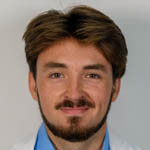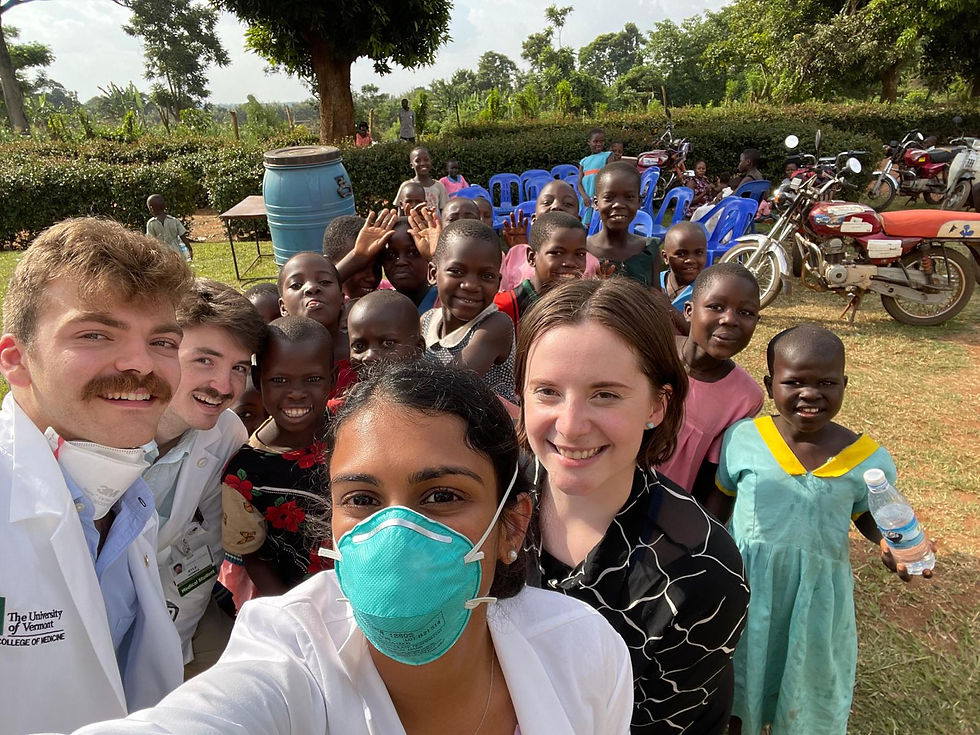Reflections from Uganda: Redefining Global Health Through Action
- Kyle Gorman

- Nov 13, 2025
- 7 min read

Written by: Kyle Gorman
University of Vermont Larner College of Medicine Global Health Elective Dates: June 26 – August 4, 2023
Week 3 Reflection
So, we have reached the halfway point: three weeks behind us and three to go. The first half of this elective has been chock-full of memories and lessons that I will not soon forget. Above all else, the most significant change I have seen so far is my general shift in expectations. Before our departure, I was hungry to learn. If you had asked me, I would have said that verbatim. Although it is only a single substitution of rhetoric, I am now hungry to experience. I classify learning as a discrete one-way street. I am presented with information in the classroom and rehearse the facts until I have mastered them. Many things can be learned; pathologies, languages, and cultural intricacies all fall under that umbrella. In contrast, experiences are greater: fleeting and unique events that cannot be recreated. The experiences here in Uganda have not only taught me things and facilitated a tremendous amount of factual learning but also impacted my perspective and my ability to understand. Even when we learn, we are learning through a lens. That lens, or that perspective, is shaped by our cumulative experiences to that point. For the next three weeks, I plan to take in as many experiences as possible to bolster that lens and perspective to facilitate my understanding of medicine and myself.

This change in approach did not come all at once but developed gradually and was catalyzed by the pivotal experiences I have had thus far. Two of those came during our rotation with the palliative care team this week. Via the rolling backroads, our four-by-four would arrive (sometimes on a spare tire) at the homes of rural Ugandans within a two-hour radius of St. Francis Naggalama Hospital. From there, the rest of the navigation was up to us. We were invited into these patients’ homes and were fortunate enough to engage in end-of-life conversations with them. I use the word “fortunate” not to reference luck but to illuminate how privileged we are as students to participate in these life-altering conversations. I have never experienced such raw vulnerability. These people not only opened their doors to us, allowing us to visualize their lived experience of socioeconomic conditions, religion, and family dynamics, but also opened their hearts to us, depicting the fine line that they toe between hope and despair. Honestly, I don’t yet have the words to describe what I am taking from this experience in a distinct sentence or two. Though I know that these situations are few and far between, to have been a part of them is extraordinary and will be an impetus for broadening my perspective in one way or another.
In addition, these visits helped illuminate the apparent dichotomy of a doctor, something I could not have hoped to understand without such formative experiences. As the visits slowly accumulated, it became clear that there was a fork in the road in each conversation: could the doctor or medical team fix anything? Fix as in solve a problem ailing the patient. Sometimes, the answer was yes; our head physician could perform a paracentesis, prescribe a higher dose of analgesics, or even write a referral to the cancer center to get a young boy’s rhabdomyosarcoma evaluated and treated. These moments were triumphant, empowering, and somewhat addictive. I would challenge anyone to cite a feeling better than giving hope to someone in the depths of their despair. On the other hand, sometimes we had to traverse a different path from that fork in the road—the unfortunate setting in which the physician or medical team could not fix anything. These situations were distressing, anxiety-inducing, and gloomy.

Every so often, a problem is just too great to be solved. Sometimes it is terminal cancer, and other times it is an issue of economics in which a patient has no affordable options to seek out treatment. At this fork in the road lies the dichotomy of a doctor—a “hero” or just another empathetic listener. As an inexperienced student, the understanding that even at the end of this incredible training, I may still be unable to solve someone’s issue is paralyzing. Although I am thankful for that widening of my perspective. As the palliative care doctors showed me, the best physician does not know the answer to every problem, but always has the ability to help. Sure, they weren’t always able to make their patients beam with joy and optimism, but they were a gentle hand there to help them through it—something you cannot learn outright but a skill mastered through experience.
Week 6 Reflection
As our time here closes, I feel overwhelming gratitude toward Uganda. I am immensely thankful for the hospitality, support, and facilitation of my learning—by no means an exhaustive list. These factors, among others, have allowed me to take away countless benefits from this experience. I have reflected on and touched on one or more of these lessons each week, but I have saved what I view as the most paramount for our final week—not because of a “best for last” approach, but rather because I needed time to process and complete my thoughts on this topic. As this worldly experience ends, I am just beginning to scratch the surface of social determinants’ role in health and happiness. As preclinical students, we spend considerable time discussing these factors and how they contribute to health outcomes. Economic stability, access to education and healthcare, neighborhood environment, and community context are not new concepts to me; seeing them firsthand is.

On a guided tour through Kampala, one of the more magnificent sights was the Uganda National Mosque. Not only were the building and architecture impressive, but so was the towering minaret that looked over the mosque and the capital city. We stopped at the washrooms following our descent down the 270-step spiraled staircase. Upon my exit, a seven- or eight-year-old boy chased me down. He was wearing a school uniform composed of a short-sleeve button-down shirt, red tie, and shorts—all worn but clean. When he caught up to me, he asked if I was Muslim, which I denied. He then offered me a folded piece of paper from his breast pocket, saying he had statistics on Islam in Uganda. I took the form and unfolded it with curiosity, hoping to find statistics about what percentage of Ugandans followed the teachings of Allah. There were no dazzling data inside, but there were red numbers and a stamp that read “past due.” The boy had handed me a bill for his school tuition.
In truth, I didn’t know what to do next. I had shillings in my pocket, and he certainly could use them more than I could, but would I just be delaying the inevitable by helping him out then and there? I wasn’t sure, and I am still unsure. Out of principle, I decided I wanted my impact on Uganda to be systemic and all-encompassing, not just at the individual level as he requested. I handed him the bill back and replied with all I could muster, “I’m sorry, but good luck. Seriously.”
The realizations I take from this experience are twofold—one inherent to the boy and the other intrinsic to myself. Firstly, I’ll touch on the boy. I believe part of the reason this encounter moved me so deeply was because of the similarities I saw between myself and him. He was chasing education more than money, had identified the best place to address his issue, and had tenaciously pursued solutions to his obstacle. This process is not dissimilar to how I approach financing my secondary education. I worked waiting tables as much as possible at the fanciest restaurant that would have me, maximizing my earning potential and contributions to funding my education. First in restaurants as an undergraduate, now as a tutor in medical school, I have always put attentive effort into financing my goals and academic aspirations. So many similarities beg the question: what is the difference between him and me? That much is clear. Social factors make our situations widely unalike. He lacks access to education, his home environment is such that he must take issues into his own hands, and his community context lands him on street corners rather than in classrooms. What ails this young man is not sickness but circumstance. Yet here I stand across from him, not only on the street but also on the other side of these social factors. Textbooks can say all they want about social determinants of health and happiness, but nothing compares to feeling them in your bones.

Now to myself. Upon walking away from that encounter, I wished I could show him how much I understood; I wanted to prove I wasn’t ignorant of his obstacles and, more than anything else, to show that I cared. I hate the thought of being just another mzungu who comes to this country and uses up the few resources for tourist interests. I wanted to show my awareness and social consciousness rather than disappoint him. Just the power we carry in our skin complexion was crippling at that moment. I felt guilt, unworthiness, and helplessness. Herein lies my takeaway: the empathy and awareness I pride myself on mean nothing without action. Meaning well, being aware of systemic issues, and even advocating for change do nothing when you are on the sidelines. Even if I had the money to change the course of this boy’s life, would that stop the next boy or girl from seeking foreigners’ money outside the mosque? No. I could give all the resources I could ever get my hands on, and it would only be a drop in the bucket. Conversely, action to change the situations of this boy and all his peers would be drastically more powerful than reassurance spoken on the street.
Several incredible people we met along the way serve as role models in this pursuit. Take the Mount Sinai physicians who shared our guest house and established a program at St. Francis Hospital to conduct weekly outreach programs to treat patients needing palliative care. They used their knowledge and training to initiate community-level change through teaching and their time—less so through funding and passive efforts. Because of their labors, Ugandans within a wide radius of the hospital can live out their lives in comfort and ease—an impact I think would be impossible to quantify. This summation of experiences has helped me redefine my understanding of global health: it is performed, not just understood.










